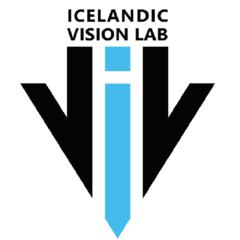News
Research position on mapping and tracking visual object representations
The Icelandic Vision Lab advertises a three-year Ph.D. position or a two-year postdoctoral position, potentially extendable for one year. The position is fully funded by the Icelandic Research Fund (IRF) through project grant “Mapping and tracking visual object representations: Individual abilities and disabilities”. Principal Investigator is Dr. Heida Maria Sigurdardottir.
Apply: english.hi.is/vacancies
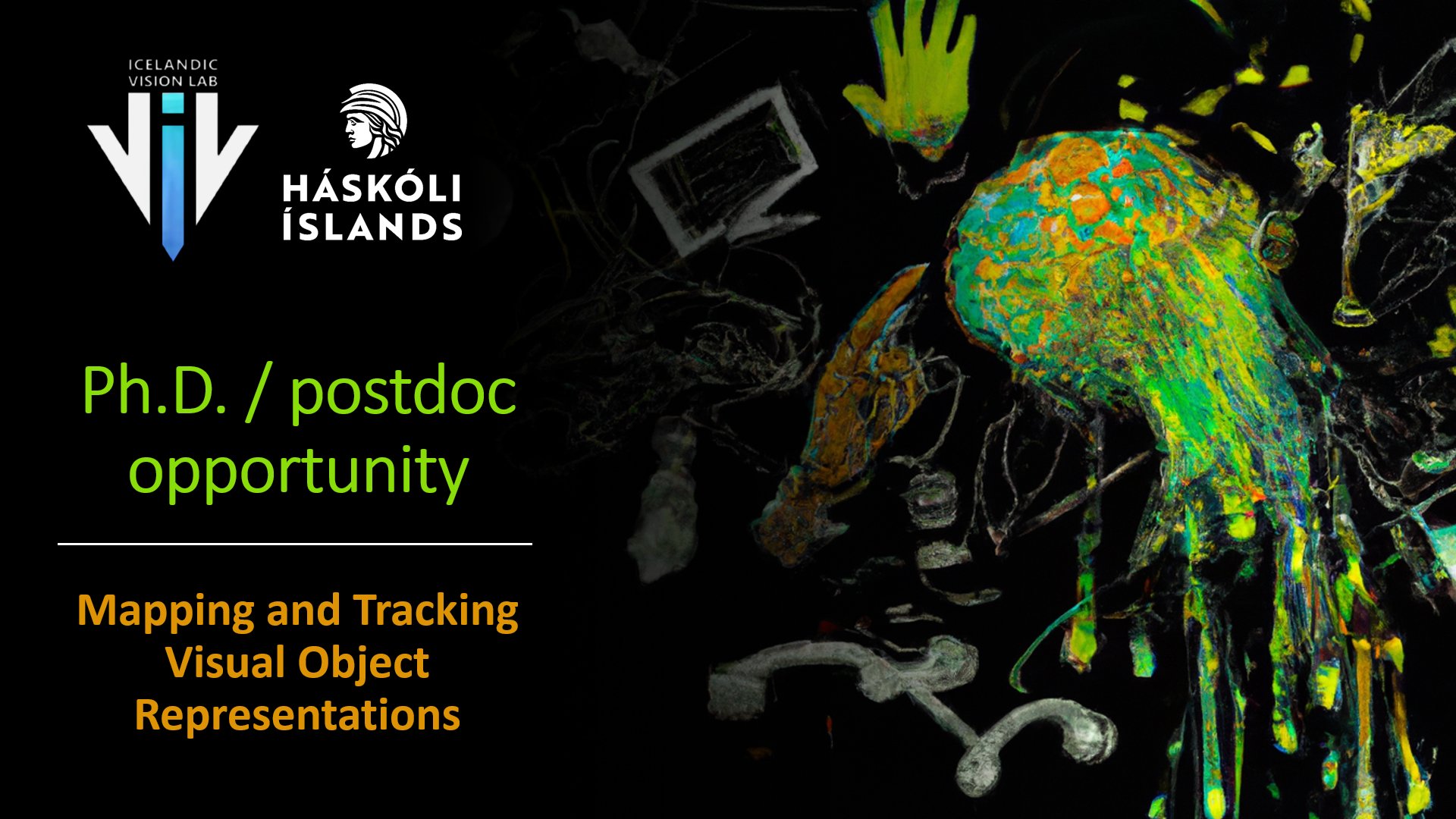
PhD position at the Icelandic Vision Lab
Project title: Probabilistic attentional selection in vision
The Icelandic Vision Lab (www.visionlab.is) advertises a 3–year PhD position, fully funded by a grant from the Research Fund of the University of Iceland. The successful candidate will work under the supervision of Professor Árni Kristjánsson (University of Iceland) and Associate Professor Árni Gunnar Ásgeirsson (University of Akureyri, Iceland). People with backgrounds from various disciplines will be considered, e.g. Neuroscience, Biology, Psychology, Mathematics, Engineering. A Masters degree in relevant disciplines is required. Experience of research relevant to the topic is a big plus.
The PhD work has three main objectives, focusing on attentional function in environments containing different statistical information: 1) To evaluate multitarget selection to attempt to decisively address the question of whether such representations are tuned probabilistically, 2) Use Virtual Reality technology to implement context induced changes to the perceived nature of visual stimuli, 3) To investigate how distribution–based information affects oculomotor selection.
The project will involve behavioral studies, computational modelling, Virtual reality experiments and eyetracking. The work will involve a collaboration between the laboratories that the principal investigators run at the University of Iceland and University of Akureyri.
Experience with experimental psychology software (PsychoPy/Psychtoolbox), programming (Python/MATLAB/C/C++), statistical software such as R, experience of experimentation within VR environments are all definite benefits but promising candidates showing enthusiasm and willingness to learn these methods will also be considered.
The Icelandic Vision Lab offers a stimulating academic environment, and is headed by professors Árni Kristjánsson, Heiða María Sigurðardóttir and Árni Gunnar Ásgeirsson. The laboratory has an extended network of collaborations, from all over the world and is in many ways unique in this international aspect.
The successful candidates will join this vibrant community of graduate students, post–docs and faculty who all work on varied aspects of visual perception. The lab is well funded with grants from the Icelandic Research Fund, The European Research Council and the Research Fund of the University of Iceland. There is good access to necessary equipment for the studies. The lab has high-end equipment for VR experiments, for eye movement studies, for EEG, as well as extensive experience with high quality psychophysical studies.
Iceland consistently ranks as one of the best places in the world to live:
(http://worldhappiness.report/ed/2021/), life satisfaction is among the highest in the world(http://www.oecdbetterlifeindex.org/topics/life-satisfaction), and the country is consistently rated the most peaceful in the world (http://worldpopulationreview.com/countries/most-
peaceful-countries/). Iceland also ranks at the top of the world in terms of gender equality (https://www.weforum.org/agenda/2019/12/gender-gap-equality-women-parity-countries/). Applicants of any gender are strongly encouraged to apply.
Starting April 1st, 2022, we will start evaluating applications, but no firm deadline is set at this point.
Please send applications containing CV’s and statements of your interest, explaining relevant experience to ivl.application(Replace this parenthesis with the @ sign)gmail.com
Post-doctoral Position and PhD position at the Icelandic Vision Lab.
The Icelandic Vision Lab (www.visionlab.is) advertises two positions: 1) A post-doctoral position, for two years, potentially extendable for one year 2) A 3-year PhD position. Both are fully funded by a grant from the Icelandic Research Fund (IRF). The successful candidates will work under the supervision of Professor Árni Kristjánsson (University of Iceland) and Dr. David Pascucci (at the EPFL Lausanne). People with backgrounds from various disciplines will be considered, e.g. Neuroscience, Biology, Psychology, Mathematics, Engineering. A PhD (for the post-doc position) and a Masters degree (for the PhD position) in relevant disciplines are required.
The positions involve research into representations of statistical variation in artificial displays and natural scenes. Recent evidence shows that observers can have a remarkably detailed representation of the distributions of stimuli in the environment. The work will involve investigations into how this feature distribution learning interacts with other history based learning effects such as serial dependence. Research findings relevant to the project have been published in various prominent academic journals (see for example www.visionlab.is/publications).
The project will involve behavioral studies, computational modelling and EEG work. The work will involve a collaboration between the laboratories that the principle investigators run at the University of Iceland and EPFL in Lausanne. The primary place of work will be the Icelandic Vision Lab in Reykjavik but the work will include extensive collaboration with the laboratory of Psychophysics at EPFL in Lausanne.
Experience with experimental psychology software (PsychoPy/Psychtoolbox), programming (Python/MATLAB/C/C++), statistical software such as R, computational modelling in vision, are all definite benefits but promising candidates showing enthusiasm and willingness to learn these methods will also be considered.
The Icelandic Vision Lab offers a stimulating academic environment, and is headed by professors Árni Kristjánsson, Heiða María Sigurðardóttir and Árni Gunnar Ásgeirsson. The laboratory has an extended network of collaborations, from all over the world and is in many ways unique in this international aspect. The planned collaboration will involve potential periods abroad at EPFL, one of the leading universities in Europe.
The successful candidates will join this vibrant community of graduate students, post-docs and faculty who all work on varied aspects of visual perception. The lab is well funded with grants from the Icelandic Research Fund, The European Research Council and the Research Fund of the University of Iceland. There is good access to necessary equipment for the studies. The lab has high-end equipment for EEG, eye movement studies as well as extensive experience with high quality psychophysical studies.
Iceland consistently ranks as one of the best places in the world to live: (http://worldhappiness.report/ed/2019/), life satisfaction is among the highest in the world (http://www.oecdbetterlifeindex.org/topics/life-satisfaction), and the country is consistently rated the most peaceful in the world (http://worldpopulationreview.com/countries/most-peaceful-countries/). Iceland also ranks at the top of the world in terms of gender equality (https://www.weforum.org/agenda/2019/12/gender-gap-equality-women-parity-countries/). Applicants of any gender are strongly encouraged to apply.
Starting May 1st we will start evaluating applications, but no firm deadline is set at this point.
Please send applications or inquiries to IVLapplications2020(Replace this parenthesis with the @ sign)gmail.com.
IVL PIs will not attend
International societies should meet where all nationalities can attend. Icelandic Vision Lab’s principal investigators will therefore not attend VSS 2020 conference in FL.
Postdoctoral position available
The Icelandic Vision Lab, headed by Drs. Heida Maria Sigurdardottir, Árni Gunnar Ásgeirsson, and Árni Kristjánsson, advertises a 2-year full-time position for a postdoctoral researcher. The position will entail combined behavioral and EEG measures of high-level visual processing in dyslexic and typical readers.
The successful candidate will work under direct supervision of Dr. Heida Maria Sigurdardottir. Other collaborative partners are Drs. Yvonne Höller (University of Akureyri), Paolo Gargiulo (Reykjavik University), and Freyja Birgisdottir (University of Iceland). The position is fully funded by a grant from the Icelandic Research Fund (IRF).
According to our high-level visual dysfunction hypothesis, the reading problems of some dyslexic readers are a salient manifestation of a more general deficit of visual cognition stemming from disrupted functioning of high-level visual regions. These regions play a fundamental role in the visual recognition of words and other objects. Supporting the hypothesis, our previous studies (Sigurdardottir et al., 2015; 2017; 2018; 2019) indicate that people with dyslexia have problems with tasks thought to rely on high-level regions of the ventral visual stream.
The primary research question tackled by the successful candidate for this postdoctoral position is whether the high-level visual dysfunction hypothesis holds true as we put the hypothesized deficient neural processing of high-level visual mechanisms in dyslexia to a direct test by applying a combination of behavioral and EEG measures. This research will be informative for theories of visual word, face, and object processing as well as for theoretical accounts of dyslexia, and could provide the foundation for the development of novel screening methods and training programs for dyslexic readers.
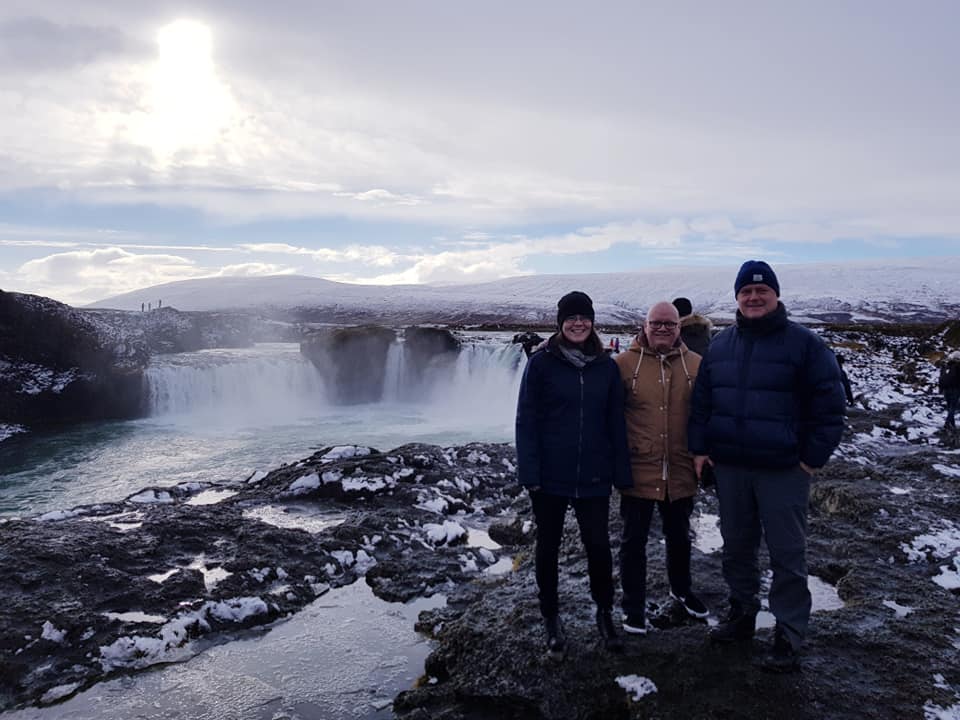
Qualifications:
We are looking for a candidate who has a Ph.D. (or equivalent) in a relevant field (including but not limited to cognitive neuroscience, cognitive science, or experimental psychology). EEG experience, a strong publication record, strong computational/data analysis skills, programming/scripting experience (e.g. MATLAB, Python, R), experience in the fields of high-level vision/dyslexia, and excellent communication skills in written and spoken English are all desirable assets. This should nonetheless read more as a wish list rather than strict requirements, and we encourage all interested candidates to apply!
The Lab:
The Icelandic Vision Lab offers a stimulating academic environment. Despite the name, the lab is truly international with current members and alumni from seven countries across the world. The successful candidate will join this vibrant community of graduate students, postdoctoral researchers, and faculty who all work on various aspects of perception and cognition. The lab is well funded and provides good access to necessary equipment for the studies.
The Country:
Iceland consistently ranks as one of the best places in the world to live: Icelanders are among the happiest people in the world according to many polls and life satisfaction is among the highest in the world. Iceland is rated the most peaceful, most gender-equal, and most LGBTQ-friendly country in the world. Iceland has spectacular nature and a buzzing cultural scene. And finally, there are no mosquitoes in Iceland!
The position offers the opportunity to work within a vibrant scientific community in a country consistently found to be among the best places to live in the world.
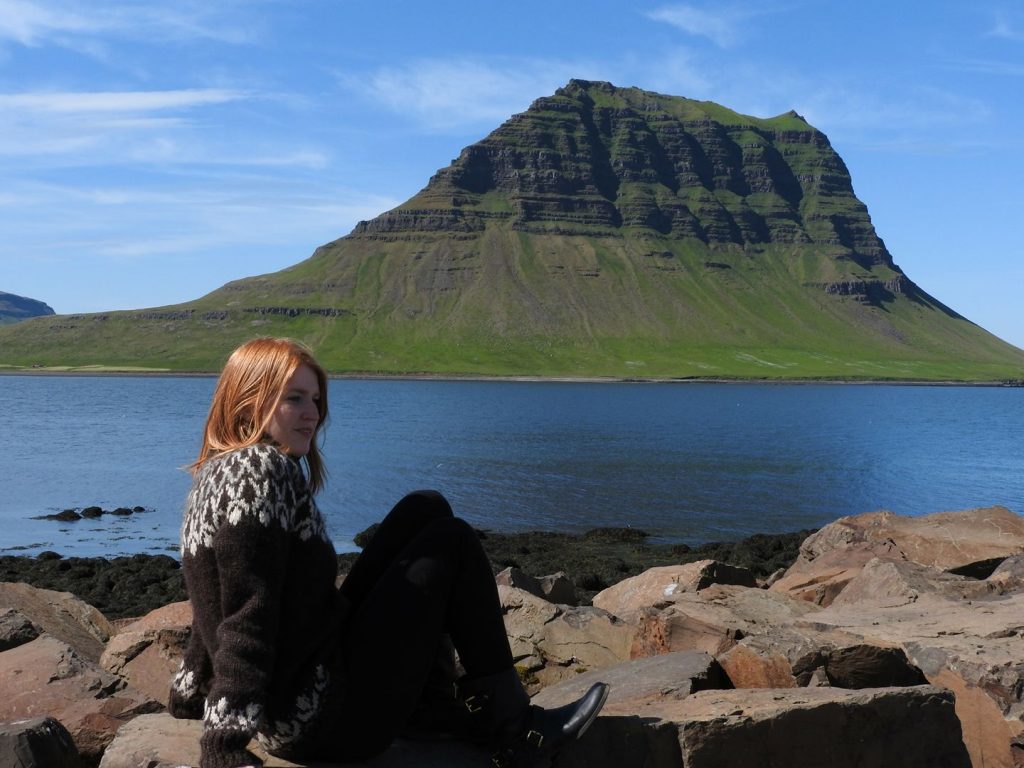
Further Information:
For further information, please contact Heida (heidasi(Replace this parenthesis with the @ sign)hi.is). The deadline for applications is June 10th. Starting time is negotiable, but the suggested time is August 20th.
Heida and several other members of the Icelandic Vision Lab will be at the VSS meeting, May 17-22 in St. Pete Beach, FL, and we would be happy to meet with potential applicants there.
Applications:
Please apply through the University of Iceland website, vacancies. Applicants should send in their curriculum vitae, a letter outlining their research experience and career goals, a list of peer reviewed publications, as well as the contact details (names, emails, and phone numbers) of two academic referees.
All applications will be answered, and applicants will be informed about the appointment when a decision has been made. Applications may be valid for six months after the application deadline.
Appointments to positions at the University of Iceland are made in consideration of the Equal Rights Policy of the University of Iceland.
This position is supported by the Icelandic Research Fund for two years. The salary for the position will be in accordance with the current collective wage and salary agreement between the trade union and the Minister of Finance.
References:
Sigurdardottir, H. M., Hjartarson, K. H., Gudmundsson, G. L., & Kristjánsson, Á (2019). Own-race and other-race face recognition problems without visual expertise problems in dyslexic readers. Vision Research, 158, 146-156. PDF
Sigurdardottir, H. M., Fridriksdottir, L.E., Gudjonsdottir, S., & Kristjánsson, Á. (2018). Specific problems in visual cognition of dyslexic readers: Face discrimination deficits predict dyslexia over and above discrimination of scrambled faces and novel objects. Cognition, 175, 157-168. PDF
Sigurdardottir, H. M., Danielsdottir, H. B., Gudmundsdottir, M., Hjartarson, K. H., Thorarinsdottir, E. A., & Kristjánsson, Á. (2017). Problems with visual statistical learning in developmental dyslexia. Scientific Reports, 7(1), 606. PDF
Sigurdardottir, H. M., Ivarsson, E., Kristinsdottir, K., and Kristjánsson, Á. (2015). Impaired recognition of faces and objects in dyslexia: Evidence for ventral stream dysfunction? Neuropsychology, 29(5) 739-750. PDF
IVL Lab Trip / Meeting at Stykkishólmur
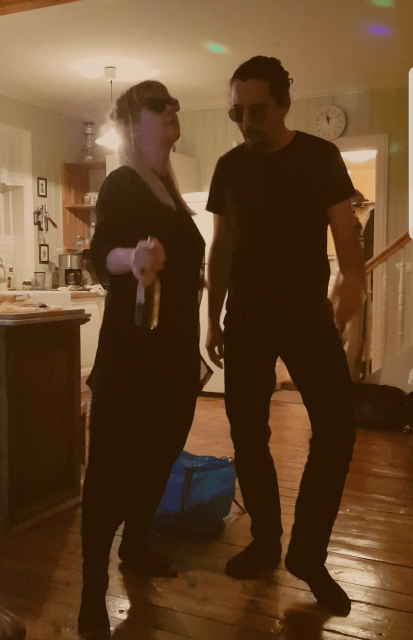
Vala and Daglar dancing
Members of IVL packed their bags on Friday and drove to the town of Stykkishólmur on the Snæfellsnes peninsula. The weekend was packed with scientific talks, not-so-scientific visits to pools and cafés, an Iranian dinner (thanks to Bahareh and Mohsen), the Human Karaoke Machine (AKA Árni Kristjánsson’s guitar), the Non-Human Karaoke Machine (with disco lights), shady dancing (see GIF), and general silliness.
New grants
The Icelandic Vision Lab celebrates two new grants awarded by the Icelandic Research Fund. Heida Maria Sigurdardottir receives a project grant for the project “Neural measures of high-level visual processing in dyslexic and typical readers”. Vigdis Vala Valgeirsdottir receives a doctoral grant for the project “Evaluating and identifying the benefits of neuroprostheses”; her mentor at the IVL is Árni Kristjánsson. W00P WooP!
We are all mad scientists here…
Kristinn Ingvarsson visited the lab during a pilot experiment to take some pictures. This one apparently came straight from a silent horror film.
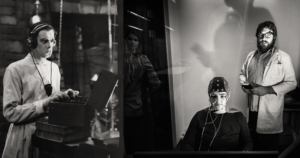
New website
The visionlab.is website has officially been launched. We sincerely thank Haukur Svansson for his help. All hail the new website!
